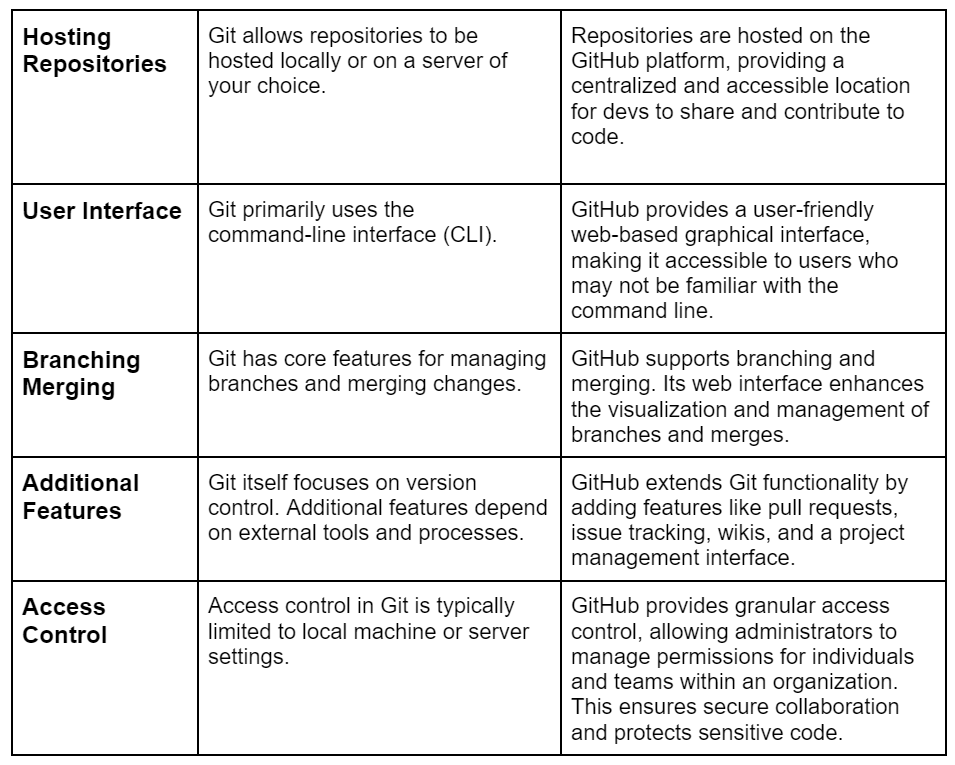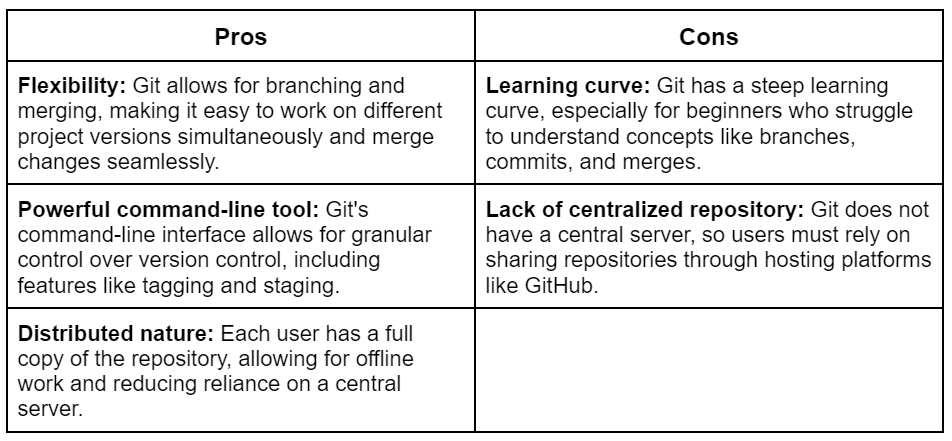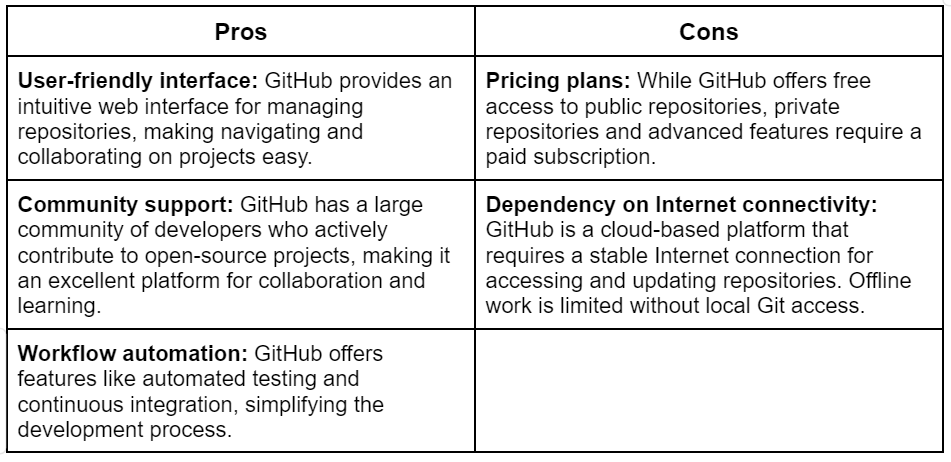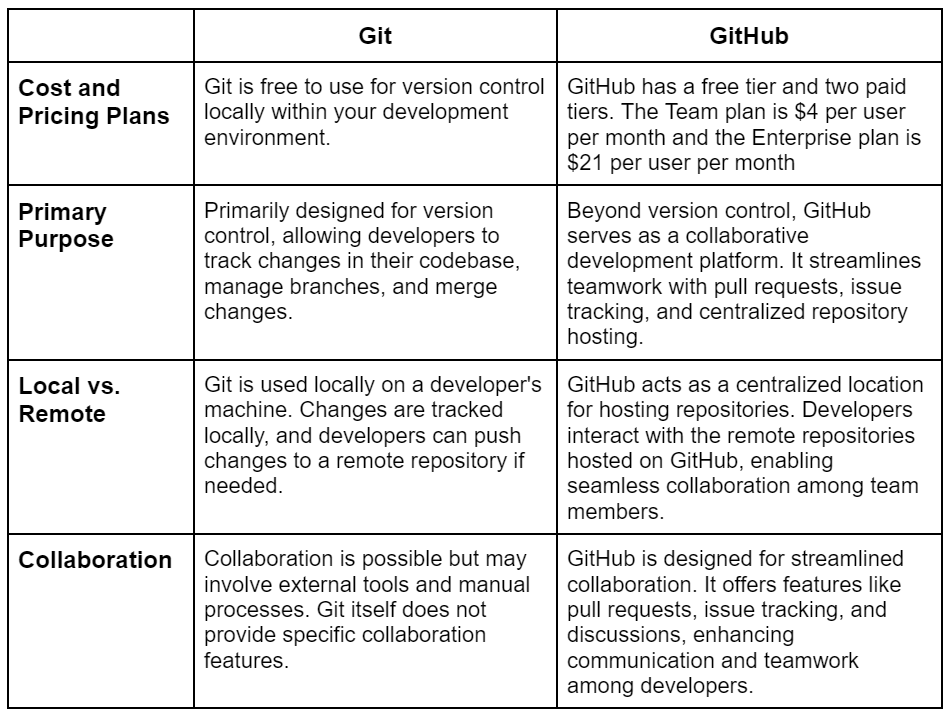Around 85% of developers believe that Git makes collaboration easier on projects. However, with so many options available, it’s easy to get overwhelmed, especially when choosing between Git and GitHub. While they might sound similar, they serve distinct development purposes.
Git, a version control system, is indispensable for managing and tracking changes in your code, offering a robust framework for individual and collaborative work. On the other hand, GitHub, a hosting service for Git repositories, takes collaboration and project management to the next level, providing a platform for sharing and refining code with teams and the open-source community.
But how do you know which one is right for your specific needs? In this article, you’ll explore the differences and use cases of Git and GitHub and learn how to choose the right one.
Differences Between Git and GitHub
Here is a quick comparison between Git and GitHub:

Security and Accessibility
Both Git and GitHub offer several security features and accessibility options. Git, being a distributed version control system, provides the security feature of data redundancy. Each clone of a Git repository contains a complete copy of the entire history of that project, ensuring that data is not lost in case of hardware failures.
GitHub, as a web-based hosting service for Git repositories, also offers several security features. It uses HTTPS to encrypt all data transfers, ensuring confidentiality and preventing eavesdropping. GitHub also implements access controls for repositories, allowing users to control who can view, clone, and contribute to their repositories.
Additionally, GitHub provides two-factor authentication (2FA), adding an extra layer of security for user accounts.
Both Git and GitHub prioritize user data privacy and employ measures to protect it. They have privacy settings that allow users to control the visibility of their repositories and the information associated with their profiles. Users can keep their repositories private or share them with specific individuals or organizations. Both platforms also comply with industry standards and regulations to protect user data and ensure privacy.
Authentication and authorization mechanisms differ between Git and GitHub. Git uses SSH keys or username/password combinations for authentication, while GitHub supports the same methods, personal access tokens, and OAuth for authorization. GitHub also offers additional security measures, such as Security Alerts, which notify repository owners of potential project vulnerabilities.
Features and Functionality
Git is a distributed version control system (DVCS) that allows multiple developers to work on a project simultaneously and independently. It enables users to track file changes, create branches for experimentation, and collaborate on complex coding projects.
Git’s distributed nature means all team members can access the entire codebase, allowing easy collaboration, code reviews, and merging code changes.
Key features of Git include:
1. Branching: Users can create branches to work on new features or experimental changes without affecting the main codebase. Branches can be merged back to the main branch once changes are tested and approved.
2. Secure Commits: Git provides a secure way to commit changes to the repository, ensuring that only authorized users can make modifications.
3. Email Notification: Git can send email notifications to users when changes are made to the repository, keeping the development team informed about project updates.
GitHub is a web-based platform built on Git that provides additional features and functionality for code hosting and collaboration. It enhances Git by adding a web interface, issue tracking, code review, and more.
Key features of GitHub include:
1. Issue Tracking: Developers can create, assign, and track issues related to a project. This helps in managing bug fixes, feature requests, and discussions.
2. Code Review: GitHub facilitates code reviews by allowing team members to provide feedback, comment on changes, and suggest improvements before merging code changes.
3. GitHub Gist: A simple way to share code snippets or small projects with others, making it easy to collaborate and receive feedback.
4. GitHub Flow: A lightweight, branch-based workflow simplifies collaboration and ensures code quality through pull requests and code reviews.
5. GitHub Pages: Host websites directly from GitHub repositories, making it simple to showcase projects or demos online.
6. GitHub Students Developer Pack: GitHub offers developer tools and resources for students, making it easier for them to learn, practice, and collaborate on coding projects.
Cost and Pricing Plans
Git and GitHub offer cost and pricing plans to cater to the varying needs of their users. Both platforms have free plans that allow unlimited public and private repositories, although these free plans come with limited advanced features.
GitHub offers a free tier that is suitable for small projects or individuals. This plan provides primary access and collaboration features, but for more advanced capabilities, users can upgrade to the paid tiers. GitHub offers Teams and Enterprise options for organizations with enhanced security controls and deployment protection rules.
These plans come with additional features such as advanced auditing, code scanning, and access provisioning. Pricing for these plans starts at $4 per user per month for the Team plan and can go up to custom pricing for the Enterprise plan, depending on the organization’s requirements.
On the other hand, GitLab offers its users Premium and Ultimate Enterprise plans. These plans provide advanced CI/CD capabilities, robust security solutions, and additional performance monitoring and compliance management features. Pricing for GitLab’s Premium and Ultimate Enterprise plans can be obtained through contacting their sales team.
Hosting Options
GitLab and GitHub provide hosting options for repositories, allowing developers to collaborate and manage their code. GitLab offers two hosting options: GitLab.com and GitLab Self-Managed.
GitLab.com is a cloud-based solution where repositories are hosted on GitLab’s servers. It offers free and paid plans, a user-friendly interface, CI/CD pipelines, project management tools, and built-in integrations. GitLab.com is suitable for individuals and small teams who want a hassle-free solution without the need to manage infrastructure.
On the other hand, GitLab Self-Managed allows users to host their repositories on their servers. It provides all the features of GitLab.com but offers more control and customization options. GitLab Self-Managed is ideal for organizations with strict security requirements or requiring more scalability. Similarly, GitHub offers hosting options like GitHub.com and GitHub Enterprise.
GitHub.com is a cloud-based platform where repositories are hosted on GitHub’s servers. It provides collaboration features, issue tracking, pull requests, and integrations with various development tools. GitHub.com suits individuals, open-source projects, and small to medium-sized teams.
On the other hand, GitHub Enterprise allows organizations to host their repositories on their private servers. It offers additional security, control, and scalability options, making it suitable for large enterprises and organizations with stringent compliance requirements.
Ease of Use
Git and GitHub are popular version control systems that have gained widespread recognition for their ease of use. Both platforms offer user-friendly interfaces and intuitive commands, making them accessible to developers of all skill levels.
Git, the underlying technology behind GitHub, features a command-line interface that allows users to navigate and manage their repositories easily. Its intuitive commands, such as “git add” to stage changes and “git commit” to save them to the repository, make version control straightforward and efficient. Additionally, Git’s branching system enables developers to work on multiple project versions simultaneously, simplifying collaboration.
GitHub takes the simplicity of Git one step further with its web-based platform. Its visually appealing and intuitive interface allows users to browse repositories, review commit history, and manage branches effortlessly. The ability to create pull requests facilitates seamless collaboration, as it enables developers to propose changes and gather feedback from their peers.
Community Support
Community support is vital in helping users navigate the complexities of Git and GitHub. Both platforms boast active communities where users can seek help and guidance and share knowledge.
For those using Git, community support is abundant. Various online forums and discussion groups are brimming with experienced users who are always willing to lend a helping hand. By asking questions and seeking advice, users can overcome hurdles and streamline their Git workflow. Additionally, Git offers comprehensive documentation that covers a wide range of topics, making it easier for users to find the insights they need.
Similarly, GitHub also prides itself on its active community support. Users can connect with other developers on GitHub’s forums, share ideas, and collaborate on projects. Moreover, GitHub provides many resources, including tutorials and guides, that help users understand the platform’s advanced features and functionalities.
Whether it’s Git or GitHub, both platforms offer robust community support to ensure users can access the help and guidance they need. From documentation to forums and tutorials, users can rely on these resources to enhance their understanding of Git and GitHub and ultimately thrive in their development endeavors.
Pros and Cons of Git

Pros and Cons of GitHub

When to Use Git or GitHub
When deciding whether to use Git or GitHub, consider your specific needs. If you’re primarily focused on version control for your codebase and wish to track changes locally on your machine, Git is the appropriate choice.
Git allows you to create branches, manage revisions, and work efficiently on development projects. On the other hand, if collaboration and centralized hosting are essential aspects of your workflow, GitHub becomes invaluable.
GitHub builds upon Git by providing a centralized platform where teams can collaborate seamlessly. It offers features such as issue tracking, pull requests, and a user-friendly web-based interface, making it a comprehensive solution for collaborative software development.
Ultimately, combining the power of Git for version control with the collaborative features of GitHub can enhance the efficiency and effectiveness of your development process.
Here is a basic breakdown of deciding when to use Git or GitHub:

Final Word
Both Git and GitHub are potent platforms for version control and collaboration. When choosing between Git and GitHub, it is essential to consider specific needs and preferences. If security and control over the codebase are paramount, Git may be the best choice.
On the other hand, if ease of use, hosting options, and collaboration features are priorities, GitHub would be the preferred platform.
Ultimately, the choice between Git and GitHub depends on the project’s specific requirements and the individual’s preferences. Whichever platform is chosen, both Git and GitHub offer powerful tools to streamline the development process and enhance collaboration.

